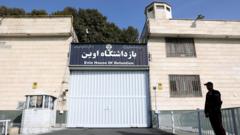The Allahabad High Court is set to deliberate on the case of Mohammed Zubair, co-founder of AltNews, who faces serious allegations including "endangering sovereignty" due to his fact-checking activities against hate speech. Critics argue that these legal actions reflect a broader trend of government suppression of journalistic freedom in India.
Indian Fact-Checker Mohammed Zubair Faces Fresh Legal Challenges Over Hate Speech Exposé

Indian Fact-Checker Mohammed Zubair Faces Fresh Legal Challenges Over Hate Speech Exposé
Mohammed Zubair, a prominent fact-checker and journalist, finds himself back in court, fighting charges related to his criticism of hate speech in a politically charged environment.
In a significant development reflecting the ongoing tension between state and independent media, Mohammed Zubair, a prominent Indian fact-checker and co-founder of the website AltNews, is facing legal scrutiny again, over accusations tied to a post addressing hate speech. This latest situation is being closely monitored as Zubair has become a pivotal figure in the fight against misinformation and hate speech in India.
The Allahabad High Court is scheduled to hear Zubair's petition as police in Uttar Pradesh are pursuing his arrest, alleging that his social media activities have “endangered the sovereignty, unity, and integrity of India.” These charges carry serious implications, including the possibility of life imprisonment or heavy fines, highlighting the precarious nature of dissent in the current political atmosphere.
Zubair, who has been recognized for exposing hate crimes, refutes these allegations firmly, stating, “I feel I’m being targeted because of the work I do.” Central to the case is a recent post by Zubair on X, where he criticized hate speech by the controversial religious figure Yati Narsinghanand, known for inflammatory comments against Muslims. Zubair's post was met with backlash, leading to protests and subsequently, police action against him.
The legal troubles began after complaints were lodged against him, part of a broader pattern many see as the government attempting to silence vocal critics. Even as a number of other individuals shared similar content, Zubair has uniquely borne the harsh brunt of the state’s legal machinery, raising concerns within human rights organizations and among journalists alike.
Pratik Sinha, co-founder of AltNews, describes the situation as a targeted assault on independent journalism, saying that the use of strict legal measures against Zubair constitutes a “classic case of shooting the messenger.” Critics assert that the new charges under Section 152 of the Bharatiya Nyaya Sanhita resemble laws from a bygone colonial era, aimed at suppressing dissent and freedom of expression.
International rights groups, including Amnesty International, have condemned the escalating harassment of journalists like Zubair, viewing the charges as an abuse of power. Similar sentiments are echoed by the Press Club of India and the Digipub group, which have declared these actions unfounded and indicative of deeper issues relating to press freedom in the nation.
The historical context of Zubair's previous legal battles adds weight to the current situation, as he was unlawfully arrested in 2022 under allegations that he insulted Hindu beliefs. Such incidents have drawn ire from the global community and highlighted an alarming trajectory for press freedom in India, reported to be sinking to a rank of 159 out of 180 countries in global press freedom rankings.
As the court date approaches, observers remain vigilant, recognizing the implications of its outcome not only for Zubair but for journalism as a whole in India, where critical voices continue to face increasing pressure amidst a climate of scrutiny and repression.




















